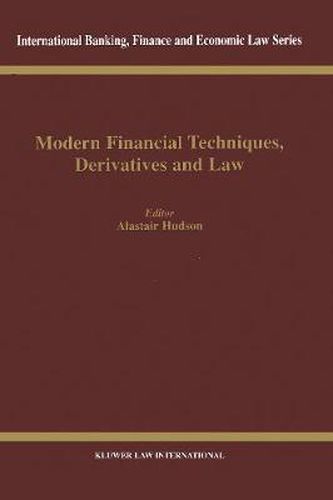Readings Newsletter
Become a Readings Member to make your shopping experience even easier.
Sign in or sign up for free!
You’re not far away from qualifying for FREE standard shipping within Australia
You’ve qualified for FREE standard shipping within Australia
The cart is loading…






This title is printed to order. This book may have been self-published. If so, we cannot guarantee the quality of the content. In the main most books will have gone through the editing process however some may not. We therefore suggest that you be aware of this before ordering this book. If in doubt check either the author or publisher’s details as we are unable to accept any returns unless they are faulty. Please contact us if you have any questions.
This work examines both the UK and international regulation, as well as the case law and legislation affecting a wide spectrum of modern financial techniques. Within the scope of those financial techniques are the broad range of instruments, structures and contracts deployed by global financial markets in relation to corporate customers, sovereign entities and other public sector bodies. The essays in this collection are concerned with the nature of the modernity of financial products like derivatives, and the particularly acute challenge that they pose both to the control of financial markets by private law and by established means of regulation. Much of the book focuses on derivatives as exemplars of this broader context. The authors analyze practical and theoretical issues as diverse as credit derivatives, dematerialized securities, the ISDA EMU protocol, and the OTC derivatives market, as well as the regulation of financial products, the economics of financial techniques, and the international regulatory framework. They examine issues of private law, including the legal implications of immobilization and dematerialization in collateral transactions, seller liability in credit derivatives markets and fraud. The essays examine the benefits and shortcomings of various legal mechanisms and methods of financial regulation, and suggest new approaches to the questions facing the law of international finance. The essays in this book arose out of the W.G. Hart workshop on Transnational Corporate Finance and the Challenge to the Law held at the Institute of Advanced Legal Studies in London in 1998.
$9.00 standard shipping within Australia
FREE standard shipping within Australia for orders over $100.00
Express & International shipping calculated at checkout
This title is printed to order. This book may have been self-published. If so, we cannot guarantee the quality of the content. In the main most books will have gone through the editing process however some may not. We therefore suggest that you be aware of this before ordering this book. If in doubt check either the author or publisher’s details as we are unable to accept any returns unless they are faulty. Please contact us if you have any questions.
This work examines both the UK and international regulation, as well as the case law and legislation affecting a wide spectrum of modern financial techniques. Within the scope of those financial techniques are the broad range of instruments, structures and contracts deployed by global financial markets in relation to corporate customers, sovereign entities and other public sector bodies. The essays in this collection are concerned with the nature of the modernity of financial products like derivatives, and the particularly acute challenge that they pose both to the control of financial markets by private law and by established means of regulation. Much of the book focuses on derivatives as exemplars of this broader context. The authors analyze practical and theoretical issues as diverse as credit derivatives, dematerialized securities, the ISDA EMU protocol, and the OTC derivatives market, as well as the regulation of financial products, the economics of financial techniques, and the international regulatory framework. They examine issues of private law, including the legal implications of immobilization and dematerialization in collateral transactions, seller liability in credit derivatives markets and fraud. The essays examine the benefits and shortcomings of various legal mechanisms and methods of financial regulation, and suggest new approaches to the questions facing the law of international finance. The essays in this book arose out of the W.G. Hart workshop on Transnational Corporate Finance and the Challenge to the Law held at the Institute of Advanced Legal Studies in London in 1998.